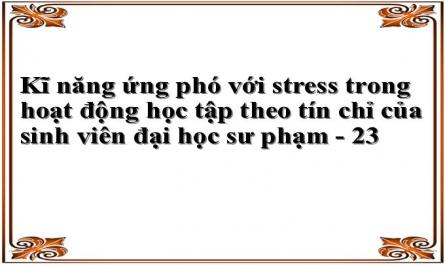theo học chế tín chỉ ở các học viện, trường đại học, cao đẳng, Học viện Quản lý giáo dục.
53. Trần Anh Thụ (2005),”Nghiên cứu stress ở tuổi trung niên”, Viện chiến lược giáo dục, Hà Nội.
54. Nguyễn Hữu Thụ (2009), Nghiên cứu nguyên nhân dẫn đến stress trong học tập của SV Đại học Quốc gia Hà Nội, Trường Đại học khoa học xã hội và nhân văn Hà Nội.
55. Trần Trọng Thủy (1978), Tâm lí học lao động (Tài liệu dùng cho học viên cao học tâm lí), Viện Khoa học giáo dục, Hà Nội.
56. Trần Trọng Thủy (1992), Một số lý thuyết về hoạt động học tập, Tạp chí nghiên cứu giáo dục số 2/1992.
57. Nguyễn Xuân Thức (2007), Giáo trình Tâm lý học đại cương, Nxb ĐHSP, Hà Nội.
58. Dũng Tiến, Thúy Nga (2004), “Những phương cách hữu hiệu phòng chống stress”, Nxb Trẻ, Hà Nội.
59. Thái Duy Tuyên (2007), Phương pháp dạy học truyền thống và đổi mới, NXB Giáo dục, Hà Nội.
60. Nguyễn Quang Uẩn (2005), học Sư phạm, Hà Nội.
Có thể bạn quan tâm!
-
 Mức Độ Và Biểu Hiện Của Stress Trước Và Sau Thực Nghiệm
Mức Độ Và Biểu Hiện Của Stress Trước Và Sau Thực Nghiệm -
 Kĩ năng ứng phó với stress trong hoạt động học tập theo tín chỉ của sinh viên đại học sư phạm - 21
Kĩ năng ứng phó với stress trong hoạt động học tập theo tín chỉ của sinh viên đại học sư phạm - 21 -
 Kĩ năng ứng phó với stress trong hoạt động học tập theo tín chỉ của sinh viên đại học sư phạm - 22
Kĩ năng ứng phó với stress trong hoạt động học tập theo tín chỉ của sinh viên đại học sư phạm - 22
Xem toàn bộ 193 trang tài liệu này.
Giáo trình Tâm lí học đại cương, Nxb Đại
61. Hoàng Văn Vân (2007), “Phương thức đào tạo theo tín chỉ: lịch sử, bản chất và những hàm ý cho phương pháp dạy-học ở bậc đại học”, Kỉ yếu hội thảo khoa học, Trung tâm đào tạo và bồi dưỡng giáo viên lý luận chính trị.

62. Nguyễn Đức Vũ (2009), “Một số giải pháp về đổi mới phương pháp dạy
-học ở đại học đáp ứng việc đào tạo theo hệ thống tín chỉ”, Kỷ yếu hội thảo
khoa học, Trường ĐH Huế.
63. Xmiecnop A.A, Leonchep A.N, Rubinxten X.I, Chieplop B.M (1975), Tâm lí học, Tập 2, Nxb Giáo dục, Hà Nội.
Tiếng Anh
64. Andrews Michelle, Ainley Mary, and Frydenberg Erica (2004), Adolescent engagement with problem solving tasks: The role of coping style, self- efficacy, and emotions, Paper presented at the 2004 AARE International Conference AND04761.
65. Bett Stebbins và Tropical, Tropical tension, Vietnam Investment Review, 1- 6, 1997.
66. Carver C.S, Scheiner M.F (1989), Assessing coping strategies: A theoretically based approach, Journal of personality and social psychology, Vol.56, p.267- 283.
67. Cary.L. Cooper and Phillip Dewe (2004), “Review stress”, A brief history, Blackwel.
68. Ensel W. M., Lin N. (1991), The life stress paradigm and psychological distress, Journal of health and social behaviour, v. 32, p. 321-341.
69. Frydenberg Erica, Lewis Ramon (1991), Adolescent coping: the different ways in which boys and girls cope, Journal of Adolescence 1991, Vol. 14, page 119- 133.
70. Frydenberg Erica, Lewis Ramon, Kennedy Gregor, Ardila Ruben (2003), Coping with concerns: An exploratory comparison of Australian, Colombian, German and Palestinian adolescents, Journal of Youth and Adolescence Vol.32, page 56-59.
71. Garside, Sandra G. and Kleiner, Brain H. (1991), Effective one-to-one communication skill, vol 23, No 3, p24-27.
72. Gunther K.C, Cohen L.H, Armeli S (1999), The role of neuroicism in daily stress and coping, Journal of personality and social psychology, Vol .77, No.5.
73. Haan.Selye (1956), The stress of life, New York, Mcrgan – Hill Book co Inc.
74. Hargie O.D.W (1986), A handbook of communication skills, London: Routledge
75. Hong Y, Chiu C, Dweck C.S, Lin D.M.S, Wan W (1999), Implicit theories,
attribution, and coping: A meaning system appoach, Journal of personality and social psychology, Vol.77, No.3.
76. James M. Hefferman (1973), The Credibility of the Credit hour: The History, Use and Shortcomings of the Credit System, 44 Journal of Higher Education 61.
77. Jerrold S. Greenberg (2008), Comprehensive Stress Management, Mc Graw Hill.
78. Keil RMK. (2004), coping and stress: a conceptual analysis, Journal of advanced nursing, tr.659-665.
79. Kumarmahi (2007), Stress coping skills, Inc.
80. Lazarus và Folkman (1984), Stress, appraisal, and coping, NY.
81. Lewis, Lanora (1961), The Credit System in Colleges and Universities, New Dimensions in Higher Education.
82. Louise A.Webb (1999), Congruence between coaching interventions and children’s coping style: effects on coping, University of Saskatchewan, National library of Canada.
83. Maria Cristina Richaud (2000), Development of coping resources in childhood and adolescence, The 18th International Congress of Psychology - Stockholm, Sweden.
84. Mick betts and Robin Smith (2005), Developing the credit -based modular curriculum in higher education: challenge,choice and change, Francis E -Library.
85. Morales S.A & Shaefor W (1987), Social Work a Profession For Many Faces, Allyn & Bacon Press.
86. Myers L.B, Brewin C.R (1998), Recall of early experience and the repressive coping style, Journal of abnormal psychology, Vol.103, No.2.
87. Richard N.J (2003), Basic Counseling Skills, SAGE.
88. Robert Allen & Geoff Layer (1995), Credit-Based Systems as Vehicles for Change in Universities and Colleges, London-Philadelphia.
89. Segersform S.C, Talor S.E, Kemeny M.E, Fahey J.L (1998), Optimism
associated with mood, coping, and immune change in response to stress,
Journal of personality and social psychology, Vol.74, No.6.
90. Terry D.J (1991), Coping resourrces and situational appraisal as predictors of coping behavior, Personality and individual differences, Vol.12, Issue 10.
91. Zjhra. M. (2008), A Shift in the Credit -based system: Necessary Changes in Curriculum and the Role of the Teachers, Published in the November, 2008 issue of the Educational Review



